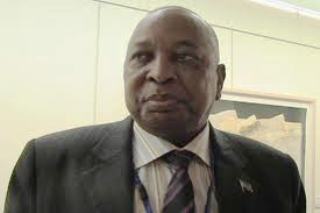South Sudan finance minister downplays calls on him to resign over foreign exchange rate
December 18, 2015 (JUBA) – South Sudanese finance minister has downplayed calls on him to resign from his position after announcing reforms to float exchange rate as part of attempts to fix the struggling war induced economy in the country.

“What is important now is not what others are saying, including those calling for resignation. What is important is to enlighten our people about the benefits which will come from the implementation of these reforms to the country,” Athorbei told Sudan Tribune in an exclusive interview on Friday.
Athorbei argued that the reform would harmonise the foreign exchange rate in the market, despite higher rate, and allow everybody to access hard currency without preferential treatment.
The reform has abandoned a fixed foreign exchange rate in favour of floating foreign exchange, allowing market forces of demand and supply to determine the value of South Sudanese pound against foreign currencies.
After the announcement local and foreign banks in the country immediately increased the exchange rate to 20 South Sudanese pounds per a dollar and the fuel price suddenly skyrocketed to 22 South Sudanese pounds per litre, tripling the price.
The decision to further devalue the local South Sudanese currency through floating exchange has received mixed reactions, with many ordinary people and critics of the government describing it as “inappropriate and untimely.”
Adigo Onyoti, leader of the opposition Sudan People’s Liberation Movement for Democratic Change (SPLM-DC) in the national legislative assembly argued that the reform could lead to more suffering of the people.
“I don’t really know how this decision will benefit the people. I don’t know how it will work. They are talking of long run but will the people who will die as a result of this decision wait,” asked a furiously looking Anyoti when asked what he thought of the decision on Friday.
“People will die and if they die then who they (those in government) think will benefit. So for them it means people must die so that it becomes beneficial. I have never before [heard] about a policy which advocates death of the people first. I have never heard even from prominent thinkers who have discovered and came out with many theories that they have such a theory,” added Anyoti.
The opposition leader in parliament told reporters that minister of finance and economic planning, Athorbei, and the governor of central bank of South Sudan, Mayik, have failed the people and so they either resign from their positions or should be removed by a presidential order.
“You have thousands of people who are not working. They are going to be affected by this. Thousands of people have low income. Our people are going to suffer more because of the lack of studying,” he said.
However, some economists and experts supported the move to float the exchange rate, saying South Sudan was unable to sustain the fixed rate due to lack of US dollars, leaving them with no option but to float it.
(ST)
